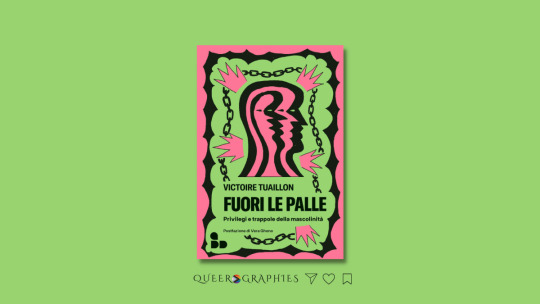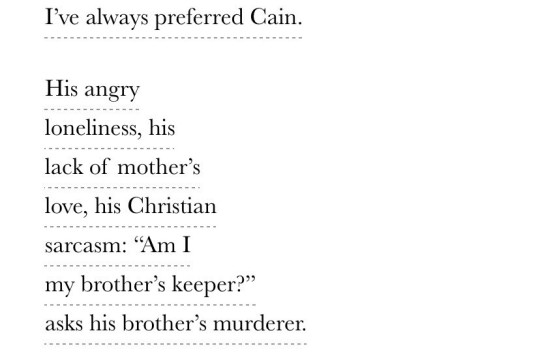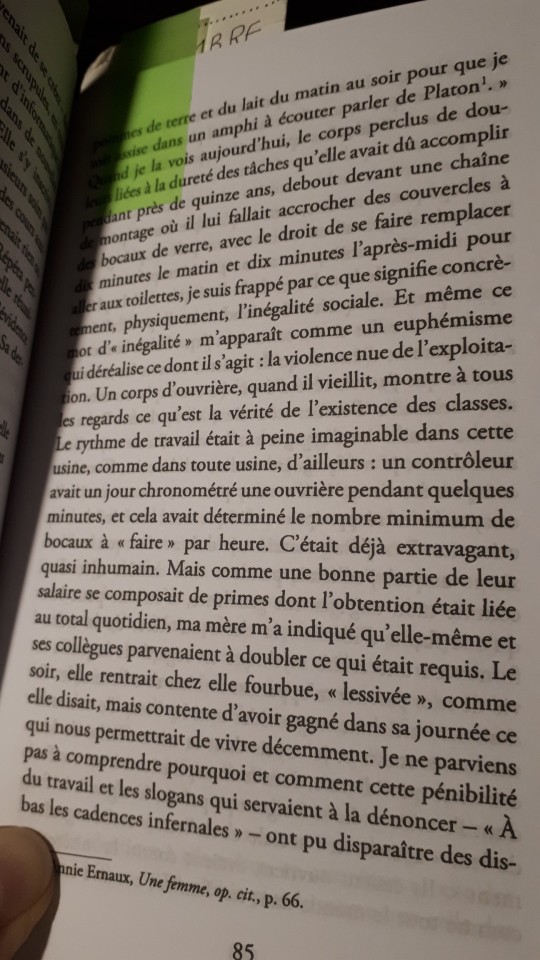#didier Eribon
Text

Drifter (2023) by Hannes Hirsch
Book title: Rückkehr nach Reims (Retour à Reims in French; 2009) by Didier Eribon
#drifter#hannes hirsch#didier eribon#french literature#books in movies#ruckkehr nach reims#retour a reims
10 notes
·
View notes
Quote
Las clases desfavorecidas creen estar accediendo a las posiciones de donde antes se las excluía, pero para cuando acceden a ellas, dichas posiciones ya han perdido el lugar y el valor que tenían en un estadio anterior del sistema.
Didier Eribon, Regreso a Reims
4 notes
·
View notes
Text
Lektionen und Exkursionen zu Franz Kafka
»Irgendwann einmal wird man wissen, warum in unserem Jahrhundert soviel große Künstler so viele unlesbare Werke geschrieben haben. Und warum diese unlesbaren und ungelesenen Bücher wunderbarerweise dennoch Einfluß auf das Jahrhundert ausübten und berühmt sind«, notierte Witold Gombrowicz in seinem Tagebuch nach der Lektüre von Franz Kafkas Roman »Der Prozess«.
Continue reading Lektionen und…

View On WordPress
#A. L. Kennedy#Adam Thirlwell#Andreas Kilcher#Arthur Schopenhauer#Christian Thanhäuser#Clemens J. Setz#Dana Grigorcea#Didier Eribon#E.T.A. Hoffmann#Édouard Louis#Esther Kinsky#Felice Bauer#Franz Kafka#Friedrich Nietzsche#Friedrich Schiller#Geoffroy de Lagasnerie#Gisela von Wysocki#Hanns Zischler#Hans-Gerd Koch#Hartmut Binder#Isabelle Lehn#Jan Faktor#Jan Peter Bremer#Jaroslav Rudiš#Johann Wolfgang von Goethe#Jon Fosse#Joseph Vogl#Karl-Markus Gauß#Katerina Poladjan#Marcel Beyer
0 notes
Text
[Fuori le palle][Victoire Tuaillon]
Che cosa vuol dire essere uomo oggi? Victoire Tuaillon indaga l’aspetto storico, sociale, filosofico e filologico del dominio maschile, affrontando i temi più attuali e controversi della mascolinità in un racconto teso a capirne meccanismi e conseguenze. Quando nasce il mito della virilità? Perché le città, gli oggetti d’uso quotidiano e il mondo del lavoro sono declinati al maschile-neutro? Cosa…

View On WordPress
#2023#ADD Editore#Chiara Licata#Didier Eribon#Elsa Dorlin#Federico Manzone#Francia#Fuori le palle#Giulia De Marco#Les Couilles sur la table#LGBT#LGBTQ#Maïa Mazaurette#Manon Garcia#nonfiction#Olivia Gazalé#Paul B. Preciado#Privilegi e trappole della mascolinità#Vera Gheno#Victoire Tuaillon#virilità
0 notes
Text
Didier Eribon – Dumézil ile Konuşmalar (2023)
Georges Dumézil, 20. yüzyılın en önemli Hint-Avrupa uygarlığı ve mitoloji uzmanlarındandır.
‘Dumézil’le Konuşmalar’, çalışmalarını nasıl ürettiğine ve geliştirdiğine dair okura ışık tutuyor.
Anılarını anlatmaktan mümkün mertebe kaçınan Dumézil, sonunda kendi hikâyesini, kariyerini ve entelektüel yaşamını anlatıyor.
Böylece 20. yüzyıl Fransası’nın düşünce yaşamına dair okura önemli veriler…

View On WordPress
0 notes
Quote
Mais pourquoi nous faudrait-il choisir entre différents combats menés contre différentes modalités de la domination ? Si ce que nous sommes se situe à l'intersection de plusieurs déterminations collectives, et donc de plusieurs «identités», de plusieurs modalités de l'assujettissement, pourquoi faudrait-il instituer l'une plutôt que l'autre comme foyer central de la préoccupation politique, même si l'on sait que tout mouvement a tendance à imposer comme primordiaux et prioritaires ses principes spécifiques de division du monde social ? Et si ce sont les discours et les théories qui nous fabriquent comme sujets de la politique, ne nous incombe-t-il pas de bâtir des discours et des théories qui nous permettent de ne jamais négliger tel ou tel aspect, de ne laisser hors du champ de la perception ou hors du champ de l'action aucun domaine de l'oppression, aucun registre de la domination, aucune assignation à l'infériorité, aucune honte liée à l'interpellation injurieuse... ? Des théories qui nous permettent aussi d'être prêts à accueillir tout mouvement nouveau qui voudra porter sur la scène politique des problèmes nouveaux et des paroles qu'on n'y entendait ou qu'on n'y attendait pas ?
DIdier Eribon, Retour à Reims
0 notes
Text
It's Not as Far from Kathmandu to Mariupol As It Is from Mariupol to Cape Cod
It’s Not as Far from Kathmandu to Mariupol As It Is from Mariupol to Cape Cod
Russia builds apartment buildings in Mariupol
Specialists from Russian Ministry of Defense have started construction of 12 residential buildings in Mariupol in June 2022. About 2.5 thousand residents will occupy more than a thousand apartments in new five-storey buildings. The flats will be fully renovated.
Commercial and non-commercial property and social facilities, such as shops, will be on…

View On WordPress
#"Returning to Reims" (book)#appeasement#Didier Eribon#Kathmandu#Mariupol#Mark Hannah#Russian invasion of Ukraine#Russian propaganda
0 notes
Text
there aren't many things that make me angry the way a The Economist's article about France makes me angry
#for my defense I clicked on it because they were recommending Didier Eribon's book#just to talk about the 'extremes' omg I'm so sick of people seeing the left (that is far from extreme) as being the same as nazis#anyway I learned my lesson#*immediately goes to the economist website*
1 note
·
View note
Text
édouard louis having dinner with judith butler tonight ❤️❤️
0 notes
Text









@polybius1201 bro hug
some bravado - emily palermo • beekeeper - keaton henson • @maybe-nextweekend • lies about sea creatures - ada limón • no place - ezra furman • returning to reims - didier eribon • the elektra complex - joan tierney / @filmnoirsbian • genesis - valzhyna mort • x • runs in the family - amanda palmer • god's gonna cut you down - johnny cash
1K notes
·
View notes
Text
Esoterische en gegronde dingen
Daar zaten we dan rond A's tafel, haar dochter C, haar zus K uit Frankrijk, haar bevriende oud-collega V, zij en ik. Tussen ons in lagen de boeken van Annie Ernaux en Didier Eribon, in Franse en Nederlandse edities. We zouden elkaar passages voorlezen en erover praten. Ik stelde vast hoe onwaarschijnlijk dit gezelschap toch was. Dat een vrouw met haar dochter en zus zoiets doet! Praten over boeken is toch iets dat alleen met vrienden mogelijk is?
In 'Het vonnis van de samenleving' van Didier Eribon, het vervolg op zijn 'Terug naar Reims', analyseert hij nog diepgaander de mechanismen die de oude maatschappelijke klassen in stand houden. Annie Ernaux ging hem voor, Edouard Louis is de jongste telg van schrijvende klasse-migranten in Frankrijk. Gedrieën vormen zij de elite van een heel specifiek literair-sociologisch-filosofisch gebied. Hoe ironisch!
Die ochtend vielen de inhoud van de boeken en het leven zelf simpelweg samen. Om de dingen even helder te maken, en zonder dat uit te spelen, zei ik dat ik in ons gezelschap de zuivere klasse-migrant was. Ha! Daar is dat oude gevoelige kinderverlangen weer me te willen onderscheiden. Al vroeg wilde ik anders worden. Dat anders-worden was iets groots en opwindends – en geen sinecure.
Als de jonge Didier op de middelbare school voor het eerst een glimp opvangt van de namen die horen bij een verre wereld van denken en literatuur vormen ze voor hem een soort 'esoterische symbolen', die hem riepen. Hij wilde niets liever dan die ruimte binnendringen. Eenmaal op weg daarheen spreekt hij zelfs van 'ambivalente roesgevoelens'. Hoe pijnlijk die ambivalentie zou worden, werd pas later duidelijk. Bijna niemand van ons gezelschap had alle boeken gelezen, en er was misschien niet één boek dat we allemaal gelezen hadden, maar de werelden van Ernaux en Eribon bezitten zo'n inhoudelijke samenhang dat het vooral hun ideeën waren die de echte gespreksstof vormden.
En toen gebeurde er iets moois. C was de dag ervoor uit Italië thuisgekomen. Daar zet zij na het conservatorium in Den Haag haar cello-studie voort. Ambivalentie mag dan een van de grote thema's zijn in de boeken van Ernaux en Eribon, toch dringt zich het idee op dat de wereld van cultuur en wetenschap hoe dan ook superieur is. C zei dat het moeilijk was om werkelijk contact te krijgen met 'gegronde dingen' en dat ze bijvoorbeeld de vader van een vriend zo bewondert om zijn praktische vaardigheden. Ze zei ook dat iemand die een bed kan maken, dat dat toch iets essentieels is in het leven, veel meer dan bijvoorbeeld praten over boeken. V zei lachend dat het ook best absurd is wat we aan die tafel deden. Ik hield C voor dat zijzelf een ambacht beheerst: het bespelen van haar instrument. Dat zou haar moeten kunnen gronden. Ik ben de dochter van een bankwerker die een conceptueel kunstenaar werd, maar die eindelijk haar ambacht vond: het schrijven.
3 notes
·
View notes
Quote
La fuerza y la riqueza de una teoría residen precisamente en el hecho de nunca contentarse con registrar lo que los "actores" dicen sobre sus "acciones", sino que, por el contrario, tenga como objetivo permitir a los individuos y los grupos pensar de manera diferente quiénes son y lo que hacen, y quizás así cambiar lo que hacen y quienes son.
Didier Eribon, Regreso a Reims
4 notes
·
View notes
Text
It is an insurmountable paradox: the gay man who decides to speak openly leaves himself open to ironic remarks or condescension, or sometimes to rebuffs, whereas the gay man who prefers to remain silent finds himself in an uncomfortable, impossible situation. The former gets lectured; the latter is made fun of. The heterosexual is privileged over the homosexual; this dissymmetry is always in play. The heterosexual decides what kind of attitude to adopt, what kind of meaning to give to a gay man’s words and gestures. The heterosexual will always have a point of view on what gay men should or should not do, should or should not be, should or should not say. The heterosexual will understand more about homosexuality than the gay man, will always have an explanation (more often than not a psychological or a psychoanalytic one) to give, and will always be ready to dismiss scornfully anything a gay man might say of himself.
The heterosexual is in an “epistemologically” dominant position, having control over the conditions of production, circulation, and interpretation of anything that might be said about this or that gay person, about gay people in general—having control, as well, over the conditions of reinterpretation and resignification of anything gay men and lesbians might say about themselves, ready to deny it, devalue it, subject it to ridicule, or simply reduce it to the state of an object within the categories of dominant discourse.
Didier Eribon, Insult and the Making of the Gay Self
18 notes
·
View notes
Text
18/04/2023
Moissac. Il m’écrit. Il me demande si j’ai lu Histoire de la sexualité. Plus tard dans la même journée il me demande si je connais le travail de José Esteban Muñoz. Il me demande aussi si j’ai vu le film Orlando de Preciado. Je me moque de lui. Je lui écris t’as tapé queer culture starter pack sur Google ? Tu me sors plus de références de pédé intello en un jour qu’en une année. Il répond rapidement c’est ça quand on donne envie d’apprendre à quelqu’un qui n’y connait rien. (La pile de livres sur sa table de chevet, il la montre en disant ça, c’est toi. (Déjà écrit ça ici il y quelques jours.) Didier Eribon, un livre de Sebastian Barry, le livre de Susan Sontag sur le camp, Édouard Louis, Le bal des folles de Copi, d’autres.)
Toulouse, je suis rentré. Je prépare la rencontre littéraire de samedi.
J’apprends à écrire. J’apprends à écrire parce qu’il faut apprendre, je n’écris pas pour quelqu’un. La première personne à qui on écrit, c’est la mère — on n’écrit pas pour elle, on écrit à elle, pour sa fête. La maîtresse nous demande de lui écrire quelque chose ; j’ai le souvenir d’un poème à recopier, de dessins autour avec de la peinture et du geste qui dit tient, c’est pour toi, c’est pour la fête des mères. Aujourd’hui, j’écris pour l’enfant que j’étais. J’écris pour l’enfant qui écrit à sa mère, pour qu’avec mes mots il puisse la rassurer.
2 notes
·
View notes
Note
bought a man’s place today i’m excited to read it also have you read anything but edouard louis or didier eribon they don’t write the same way as annie ernaux but write about the same topic(s), being from a working class background and class in france
Ahh lmk how it is! Her style in it is sort of detached but the topic is emotional and hit close to home so i was crying lots haha. And no i havent, I'll put them on my list. Do u have any specific title recs?
2 notes
·
View notes
